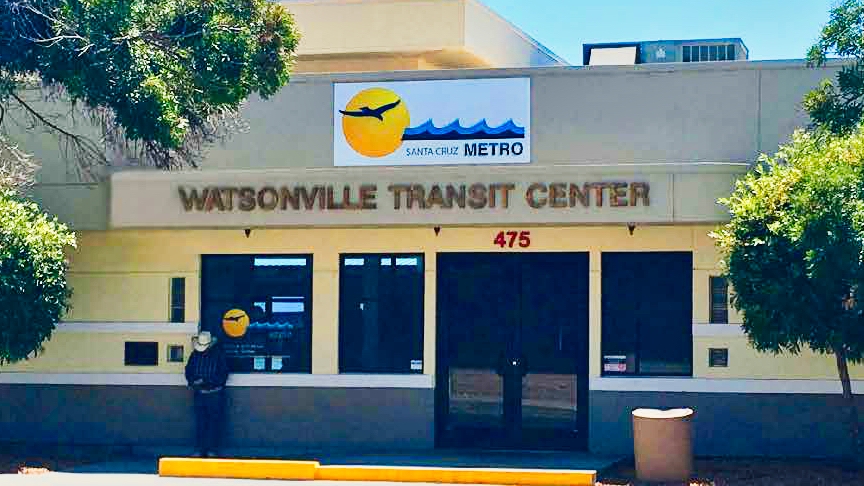December 4, 2018
Community groups, including Santa Cruz County Business Council, Campaign for Sustainable Transportation, Santa Cruz Works, Santa Cruz New Tech Meetup and Santa Cruz County Greenway announced today they are supporting METRO’s request for a detailed Alternatives Analysis of the two public transit options for the rail corridor in Santa Cruz County: rail & trail and electric bus & trail.
The Alternatives Analysis was requested by METRO and approved unanimously by its Board of Directors on November 16, 2018. The Alternatives Analysis would also fully comply with the requirements of Measure D to analyze the “best use” of the corridor. The request is timely as the RTC could vote as early as January 17th, 2019 on a plan that would re-establish rail freight for 10 years north of Watsonville and eliminate the option of running electric buses on the corridor.
The Alternatives Analysis proposed by METRO would determine the most appropriate mode of public transit for the Rail Corridor and include:
Ridership forecasts
Operating and capital costs, including “value engineering”
Funding sources for capital improvements
Funding sources for operating expenses
METRO’s staff report explains why the Alternatives Analysis is needed:
“The mode selection in this corridor should not be based on a choice between steel and rubber wheels but rather on the service profile (alignment, frequency, daily span of service) that most effectively meets the travel patterns and mobility needs in Santa Cruz County.”
The recently completed Unified Corridors Study (UCS) provides a foundation for the Alternatives Analysis but it is not sufficient by itself. According to METRO staff:
“The [UCS’s] Scenario-based analysis does not provide enough mode/corridor specific comparable data, and information is insufficient to determine the most appropriate public transit mode to pursue in the rail corridor.”
Moreover, METRO’S staff expressed concern that passenger rail could jeopardize the bus system’s already lean budget.
“All of these services and facilities could draw from the same limited funding sources. A review of the UCS suggests that some funding sources currently used for METRO operations and capital needs are being assumed as possible sources for UCS projects.”
“The Business Council represents over 80 of the major employers in Santa Cruz County,” said Robert Singleton, Executive Director. “The Council’s board issued a statement last week emphasizing incremental approaches to improve transportation in the county using already approved Measure D funds. METRO’s proposed Alternatives Analysis will provide the detailed information needed to make the right transportation decisions in the corridor.”
“METRO’s proposed Alternatives Analysis makes good policy sense,” said Doug Erickson, President of Santa Cruz New Tech Meetup. “Before locking our county into one strategy, it is essential to understand ridership forecasts, operating and capital costs, and funding sources to be able to build and operate each alternative. This work has not been done and needs to be done before a strategic direction and set investment decisions is made.”
“Greenway is interested in clean, affordable, and flexible transit options for the corridor,” said Manu Koenig, Executive Director of Santa Cruz County Greenway, “METRO already carries 5.2 million passengers every year so there may be huge benefits in expanding its service on the Coastal Corridor.”
“Campaign for Sustainable Transportation (CFST) advocates that our transportation dollars prioritize transit and active transportation,” said Rick Longinotti, Chair of the CFST. “If we want to offer a practical alternative to auto dependency, then we need to make public transit affordable, safe and convenient. We need the best information we can get before making large investment decisions.”
“Santa Cruz Works fully supports METRO's proposal to evaluate in detail all transportation alternatives for our coastal corridor,” said Keri Waters, President, Santa Cruz Works. “Our emerging economic hubs in downtown Santa Cruz and Westside Santa Cruz need better transportation links with each other, as well as to the neighborhoods of the workers that are commuting here from Watsonville and points between. The current plans don't adequately consider the rate at which our communities are adopting personal short-range transportation options like bike share and scooters, and the infrastructure needs that can and must be met for that segment.”
Contact Info: Community Groups Supporting METRO’s Alternatives Analysis
Santa Cruz County Business Council
Robert Singleton, Executive Director, Robert, singleton@sccbusinesscouncil.com
Santa Cruz New Tech Meet-up
Doug Erickson, President, dougwerickson@gmail.com
Santa Cruz County Greenway
Manu Koenig, Executive Director, manu.koenig@sccgreenway.org
Campaign for Sustainable Transportation
Rick Longinotti, Chairman, longinotti@baymoon.com
Santa Cruz Works
Keri Waters, President, keri@buoy.ai

